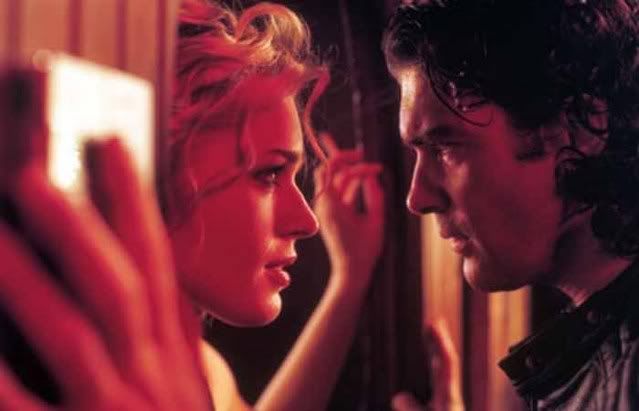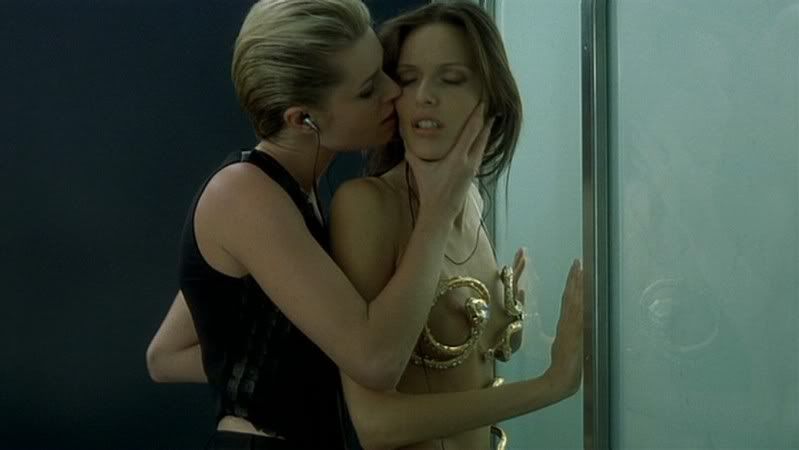Femme Fatale

by Ryland Walker Knight
Brian DePalma's no slouch. His career as a film director has produced a few great films and a lot of flashy filmmaking across his filmography--even in lesser, uneven pictures. Those films that don't quite work are dismissed in facile workaday reviews as rip offs of his obvious idol, Alfred Hitchcock. Only recently has DePalma received his own auteur label, complete with theory applied so thick you almost forget how middling that movie was you just watched. Yes, I'm talking about a few, choice critics' wild praise for the scatterbrained and briefly sparkling mess that is THE BLACK DAHLIA. (David Edelstein says it best "even with the movie’s won’t-shut-up narrator I didn’t know what was going on.") But I could also be talking about the roundly appreciated, generally well reviewed film he made just prior, FEMME FATALE.
Brian DePalma can move the camera. He's a conductor, really, orchestrating elaborate set-pieces because he's having fun. He's not a writer. FEMME FATALE was the first picture he directed in a decade from a screenplay he had written. I agree with Jonathan Rosenbaum in that it appears DePalma "set out to combine every previous thriller he'd made in one hyperbolically frothy cocktail." All the cranes, split frames, slow motion and po-mo duality/doppelganger themes we've seen before. It has everything but a leading lady to fill those big boots the title character has to wear around town.
In the flamboyant, formalist world of FEMME FATALE it shouldn't matter that Rebecca Romijn isn't the most talented performer, but that she should demand attention. A former model, Romijn has a typically beautiful model's face and lithe, toned limbs but she never projects the sex appeal and danger required for a role such as this. In the first scene, Romijn's Laure is watching the climax to Billy Wilder's DOUBLE INDEMNITY and we watch, for a minute of so, Barbara Stanwyck convey more magnetism than Romijn will during any of her dialogue-driven scenes. I think that's the problem: Rebecca Romijn's voice has too much model in it, not enough movie star, and all I hear is petulance. I never believed this woman was manipulating this world that much.
The only manipulation on display is DePalma's unrestrained play with film, from Laure's first (mute) scene to the last freeze frame. The film opens with a ludicrously fun heist sequence complete with lesbian make out, piss electrocution and a pitch black, night-vision escape. It's the high point of the film. DePalma is giddy, showing off and making an easy joke about the festival goers groping for something to hold onto in that enveloping darkness. Sight, and voyeurism in particular, is always a crucial element in DePalma's bag of filmic tricks--right up there with doubling--so it's no surprise that Laure snakes her way out of the heist amongst all those blind festival goers. (Here's where those theory-mad disciples go nuts all over their keyboards.) Romijn may be the star onscreen but really the show belongs to DePalma. And from that angle, this is a great film, full of vigor and excitement: sheer cinematic joy at work. However, it's hard to ignore such an underwhelming figure at centre of such ecstatic filmmaking. No, it cannot hold, and Rosenbaum agrees again: "I realize that De Palma's thrillers are commonly regarded as emotional rather than cerebral, but I'd question how emotional one can be about characters one only halfheartedly (quarter-heartedly?) believes in."
Antonio Banderas plays semi-retired paparazzi, Nicolas Bardo (sorta like Boudu but he's really doing the saving, in the end), who's working on a mural of photographs depicting the square his enviable Paris apartment overlooks. He takes a picture of Laure twice, the first a random snapshot without consequence--a minor annoyance for Laure--yet the second one gets him entirely too involved in her hairbrained scheme to free herself not only of a boring diplomat husband (serviceable Peter Coyote) but the men she double crossed during the opening heist. Banderas is also having fun, giving us, probably, his best English-language performance in more than a decade. He almost makes up for the cypher that is Romijn. But then, when the flip-your-lid reveal of the last act pops up to burst your noirish bubble, you have to wonder why were we given him as our only emotional connection to the characters. It's to show you, the audience, you're the patsy, too, by falling for DePalma's machinations all over again. If you surrender to FEMME FATALE you may be no better off than Banderas, drawn in by some flashy camerawork and pretty pictures left hanging in freeze frame, befuddled by something cryptic Rebecca Romijn has said trying to charm you. You know better, don't you? Go finish that mural.
02002: 114 minutes: dir. Brian DePalma: written by DePalma




Sharp, sharp, man. Now I want to see Femme Fatale just for the heist.
ReplyDeleteI think the same kind of poor casting accounts for some of Dahlia's fuctupness. I read the first few chapters of The Black Dahlia novel and the actors cast as the two detectives are just too scrubbed and soft and modern to cut it.
I think casting Hilary Swank was a big miscue as well, moreso than either of the men, to be honest. Hartnett isn't terrible but not good and Eckhart was wasted. I think Eckhart could have been a better Bucky and somebody else, maybe Christian Bale, opposite him. Also, is Scarlett Johansson really an actress or just a sexy lil' thang? I think she lucked the fuck out with LOST IN TRANSLATION.
ReplyDeleteTHis movie is so hot! really!
ReplyDelete